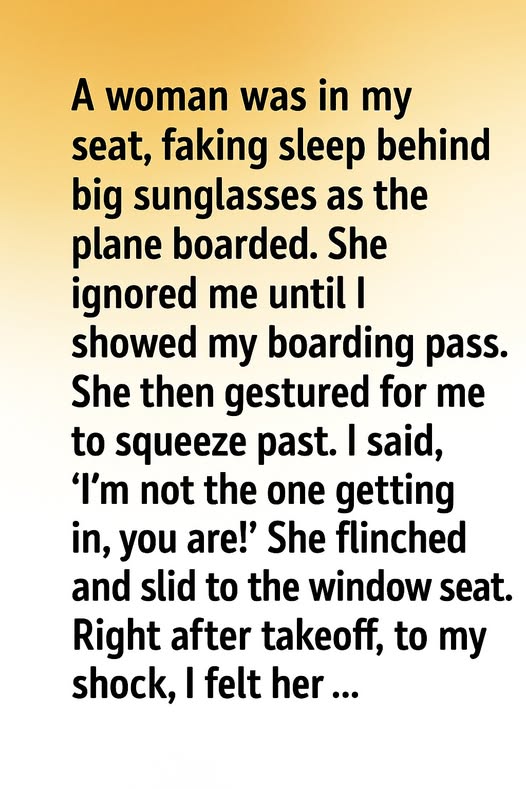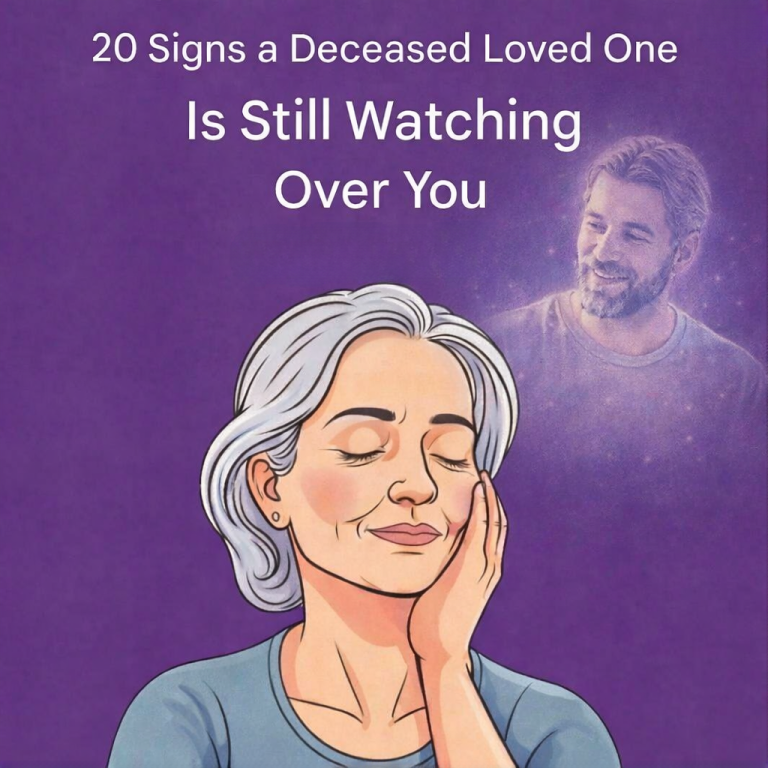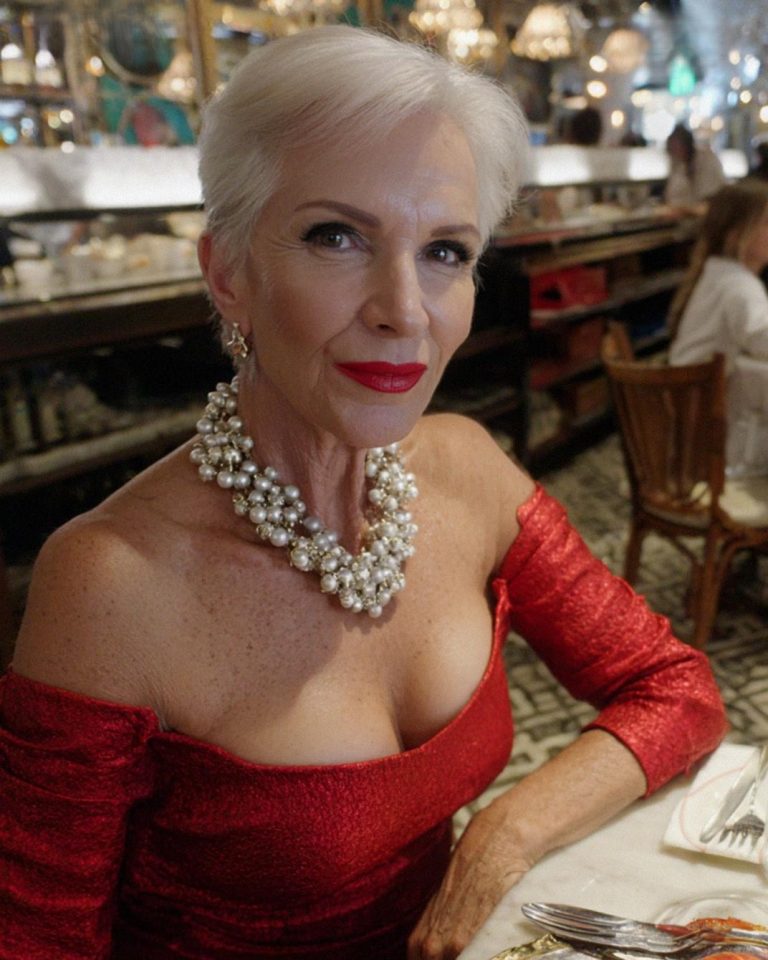
A woman was in my seat, faking sleep behind big sunglasses as the plane boarded.
I stood there awkwardly for a few moments, holding my carry-on, hoping she’d notice me. But she didn’t. She stayed perfectly still—head tilted, lips parted, pretending to be lost in some deep, fake nap.
Passengers behind me started to sigh impatiently, shifting their bags, waiting for me to move.
Finally, I cleared my throat and said, “Excuse me, I think you’re in my seat.”
Nothing.
I tried again, louder this time. Still nothing.
Only when I held my boarding pass directly in front of her face did she “wake up.” She blinked dramatically, pushed up her oversized sunglasses, and looked at me like I was the one causing trouble.
“Oh, really?” she said with a sigh, as if I’d disturbed her peace.
“Yes,” I replied, trying to stay polite. “23B. That’s me.”
She glanced at her own ticket, then made a small, dismissive motion with her hand—gesturing for me to squeeze past her to the middle seat.
I felt my patience slipping.
“I’m not the one getting in,” I said firmly. “You are.”
For a second, her jaw tightened. Then, without a word, she flinched, grabbed her purse, and slid reluctantly toward the window seat.
I sat down beside her, my heart pounding with irritation.
Great start to a three-hour flight, I thought bitterly.
Right after takeoff, to my shock, I felt her hand brush my arm.
I turned, ready to snap. But her hand wasn’t steady—it trembled. Her lips were pale.
“Are you okay?” I asked quickly.
ALSO READ : The Secret Ingredient: Why My Grandmother Always Stuck Cloves into an Onion
She nodded weakly, but the nod didn’t convince me. Her fingers were gripping the armrest so tightly that her knuckles turned white.
Then she whispered, barely audible over the hum of the engines, “I’m terrified of flying.”
The irritation in my chest evaporated instantly.
“Oh,” I said softly. “I didn’t know.”
She managed a nervous laugh. “Most people don’t. I always try to act calm, but I’m awful at this. I fake sleep during boarding so I don’t have to talk to anyone.”
The confession took me off guard. Just moments ago, I’d been ready to judge her—and now, sitting there, I realized she wasn’t rude. She was scared.
The plane shook lightly as it climbed higher. I could see her flinch with every bump.
Without thinking, I said, “Would it help if I talked to you? Distracted you a bit?”
She hesitated, then nodded quickly. “Please.”
So I started talking. About anything and everything—my kids, my favorite travel disasters, the time my suitcase ended up in Iceland instead of Italy. Slowly, she began to relax.
Her breathing steadied. Her hands unclenched. And for the first time since I’d met her, she smiled—genuinely.
Halfway through the flight, I learned her name was Lydia.
She was flying to Denver to visit her father in hospice care. He’d been battling cancer for months, and she’d been putting off the trip out of fear—fear of flying, fear of saying goodbye.
“I almost didn’t come,” she admitted quietly. “But I promised him I’d try.”
Her voice cracked.
Something in that confession hit me deep. I remembered losing my own father years ago and how it felt—the ache, the helplessness, the regret.
Without thinking, I reached over and held her hand. “You did the right thing,” I said. “He’ll be glad you came.”
She didn’t answer, but she didn’t pull away either.
When the plane hit turbulence, she clutched my arm again.
The cabin lights flickered, and a baby cried somewhere in the back. A few people gasped, but I kept talking—softly, steadily—about clouds, about how pilots train for every possible emergency, about how flying is statistically safer than driving.
By the time the turbulence passed, her breathing had evened out.
When the flight attendants rolled the snack cart down the aisle, she surprised me by ordering two coffees—one for herself, and one for me.
“Thanks,” she said shyly as she handed it over. “For… not making me feel stupid.”
“Thanks for not pretending to sleep again,” I joked, and she actually laughed—a real, full laugh.
We talked for the rest of the flight.
About life, family, fear, and the strange ways strangers sometimes cross paths just when they need each other most.
By the time the captain announced our descent, Lydia looked calmer than I’d seen her the whole trip. She even leaned over to peek out the window.
“Wow,” she whispered. “It’s actually beautiful.”
I smiled. “See? You survived.”
She grinned. “Barely.”
When we landed and people began standing up, she touched my arm one last time.
“Can I tell you something?” she said softly.
“Of course.”
She took a deep breath. “I thought I’d be sitting alone, panicking the whole flight. I didn’t expect… kindness. You made it easier to go home and face what’s waiting.”
I swallowed the lump in my throat. “I think your dad would be proud you came.”
She nodded, eyes glistening. “I hope so.”
Then she did something that stunned me—she slipped off her sunglasses, handed them to me, and said, “A reminder to look a little closer next time before judging.”
Before I could reply, she smiled, grabbed her bag, and disappeared into the crowd.
Two weeks later, I got a letter.
It was from Lydia.
Inside was a note and a photo—her and her father, sitting together on a sunny porch, both smiling.
Her handwriting was small but steady:
“He passed peacefully three days after I arrived.
Thank you for helping me get there.”
I sat at my kitchen table for a long time, staring at that photo.
One flight. One stranger. One small act of patience that changed everything.
I still keep her sunglasses in a drawer by the door. Not as a trophy, but as a reminder.
That sometimes, the people who seem difficult are just scared.
That kindness can be as simple as holding someone’s hand through turbulence—literal or otherwise.
And that one simple gesture can make a flight… unforgettable.



